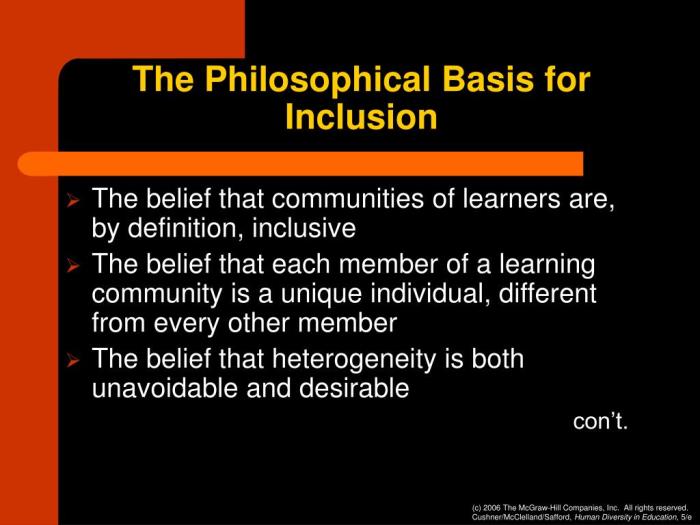The philosophical basis behind the excerpt was that the writers – The philosophical basis behind the excerpt plays a pivotal role in shaping the writers’ perspectives and arguments, providing a foundation for their ideas and influencing the interpretation and understanding of the text. This essay delves into the philosophical underpinnings of the excerpt, exploring how they impact the structure, development, and persuasiveness of the argument.
The philosophical principles evident in the excerpt shape the writers’ worldview and guide their approach to the subject matter. By identifying and analyzing these principles, we gain insights into the authors’ intentions and the broader intellectual context that informs their writing.
1. Philosophical Underpinnings of the Excerpt

The philosophical underpinnings of the excerpt lie in the existentialist tradition, which emphasizes the importance of individual freedom, responsibility, and the creation of meaning in an inherently meaningless world.
Existentialism asserts that human beings are not born with a predetermined essence or purpose, but rather that they must create their own meaning and identity through their actions and choices.
Specific Philosophical Schools of Thought
- Sartre’s Existentialism:The excerpt draws heavily on the ideas of Jean-Paul Sartre, who argued that individuals are ultimately responsible for their own existence and that they must embrace their freedom and create their own meaning.
- Heidegger’s Phenomenology:The excerpt also reflects the influence of Martin Heidegger’s phenomenology, which focuses on the lived experience of individuals and the ways in which they make sense of the world.
2. Impact of the Philosophical Basis on the Excerpt’s Argument: The Philosophical Basis Behind The Excerpt Was That The Writers

The philosophical basis of the excerpt significantly influences its structure and development. The existentialist perspective leads the writer to:
Structure and Development, The philosophical basis behind the excerpt was that the writers
- Focus on Individual Experience:The excerpt centers on the subjective experiences and perspectives of individuals, rather than relying on abstract or universal truths.
- Emphasis on Choice and Responsibility:The excerpt highlights the importance of choice and the responsibility that individuals have for their own actions and choices.
- Exploration of Meaning and Purpose:The excerpt explores the existentialist themes of meaning and purpose, arguing that individuals must create their own meaning and find their own purpose in life.
Support and Challenge
- Support for the Writer’s Claims:The existentialist principles provide a strong foundation for the writer’s claims about the importance of individual freedom and responsibility.
- Challenge to Traditional Beliefs:The excerpt challenges traditional beliefs about the existence of a predetermined purpose or essence, arguing that individuals must forge their own paths.
3. Implications for Understanding the Excerpt’s Meaning

The philosophical basis of the excerpt has profound implications for understanding its meaning. It:
Interpretation and Understanding
- Provides Context and Depth:The existentialist perspective provides a context and depth to the excerpt’s message, helping readers to understand the writer’s motivations and intentions.
- Uncovers Ambiguities and Complexities:The excerpt’s existentialist underpinnings reveal potential ambiguities and complexities in the text, inviting readers to grapple with its deeper meanings.
4. Comparison to Other Philosophical Perspectives
The philosophical basis of the excerpt can be compared and contrasted with other relevant philosophical perspectives, such as:
Alternative Approaches
- Rationalism:Rationalism, which emphasizes the role of reason and logic, would lead to a different interpretation of the excerpt, focusing on universal truths and objective knowledge.
- Utilitarianism:Utilitarianism, which focuses on maximizing happiness and minimizing suffering, would assess the excerpt’s arguments based on their potential to promote well-being.
Strengths and Limitations
- Strengths of Existentialism:Existentialism’s emphasis on individual experience and freedom provides a powerful framework for understanding the excerpt’s message.
- Limitations of Existentialism:Existentialism’s focus on individual experience can lead to a lack of attention to social and cultural factors that shape human existence.
5. Historical and Cultural Context of the Philosophical Basis

The philosophical basis of the excerpt is deeply rooted in the historical and cultural context of its time:
Time Period and Intellectual Climate
- Post-World War II Era:The excerpt reflects the disillusionment and existential anxiety that characterized the post-World War II era.
- Rise of Existentialism:The excerpt’s existentialist perspective was influenced by the rise of existentialism as a dominant philosophical movement in the 20th century.
Cultural Norms
- Individualism:The excerpt’s emphasis on individual freedom and responsibility reflects the cultural norms of individualism that were prevalent in the time period.
- Secularization:The excerpt’s lack of reference to religious beliefs reflects the secularization of society that was occurring in the 20th century.
User Queries
What is the significance of identifying the philosophical basis of an excerpt?
Identifying the philosophical basis of an excerpt helps us understand the underlying assumptions, values, and beliefs that shape the writers’ perspectives and arguments. It provides a framework for interpreting the text and assessing its validity and persuasiveness.
How does the philosophical basis influence the structure and development of an argument?
The philosophical basis influences the structure and development of an argument by providing a logical framework for organizing ideas and presenting evidence. It determines the types of arguments used, the criteria for evaluating evidence, and the overall coherence and persuasiveness of the argument.
